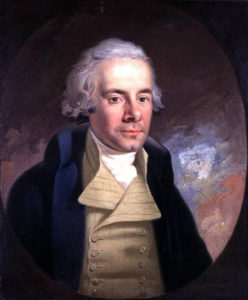1833
William Wilberforce dies
The prime mover behind the decision of the British Parliament to abolish the slave trade and then slavery itself in the Empire was born in 1759 to a family of wealthy Yorkshire merchants. With no need to earn a living, William Wilberforce was a rich young man with a penchant for parties, gambling, drinking, and travel. He entered politics at the age of 21 as an Independent but often supporting the policies of his friend William Pitt. At the age of 25 he underwent a religious conversion in which he began to take the demands of Christianity seriously. This was in a period in which an arid Deism and a disregard for traditional religion were fashionable. Wilberforce, however, made his faith the foundation of his political actions, which led him to become interested in the abolition of the slave trade.
In the late 18th century, Britain found that slavery was enormously profitable. British ships would carry wretched African captives to their colonies in the Americas, and to the Caribbean and South American plantations of other European powers as well. The cotton, sugar, rum and tobacco trades that slavery provided the labour for also made the merchants of Britain wealthy, so that to challenge the slave trade was to imperil the prosperity of the nation. Small wonder that the abolitionist movement had found little traction in Parliament despite petitions from Quakers beginning in 1783. Wilberforce became part of a group comprised of Christians inside and outside of the Anglican Church who organized to create the pressure necessary to defeat the vested interests and it was decided that he would lead the battle in the House of Commons. Bill after bill introduced by Wilberforce in the 1780s and 1790s failed until finally in 1807 the Slave Trade act was passed. Wilberforce’s reforms did not end there: he went on to press for Catholic emancipation, the total end of slavery, Parliamentary reform, and better working conditions for the poor; he was also a founder of the Society for the Prevention of Cruelty to Animals. He died in 1833 just after the passage of bills outlawing slavery in the British Empire.
The 2007 film Amazing Grace portrays Wilberforce’s struggles in Parliament and society. The title role went to Ioan Gruffudd who was less wooden than usual, his wife was played by the dazzling Romola Garai, but Albert Finney as an elderly John Newton, ex-slave trader and author of the hymn “Amazing Grace”, stole the show. Two decent biographies of Wilberforce are Eric Metaxas’s Amazing Grace: William Wilberforce and the Heroic Campaign to End Slavery, (2007) and William Wilberforce by Stephen Tomkins (2007).
